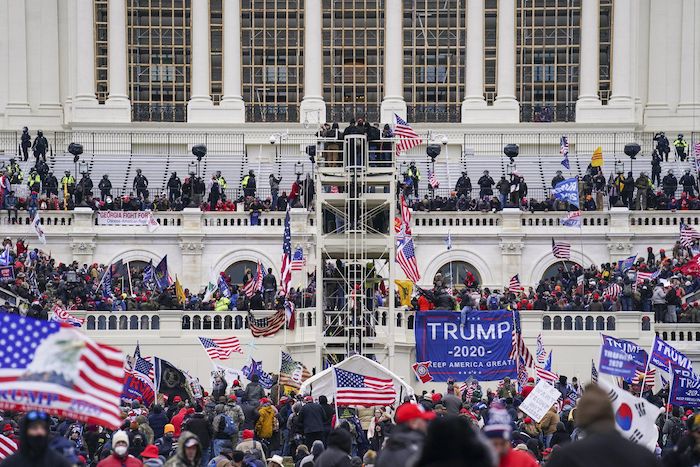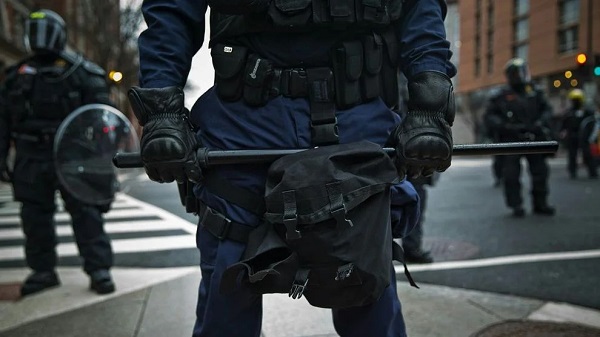International
What was the FBI up to on January 6?

Quick Hit:
President Donald Trump on Saturday called for answers after a report detailed how at least 274 undercover FBI agents were present at the U.S. Capitol on January 6, 2021. He said the finding contradicts Director Christopher Wray’s repeated denials and demanded to know “who each and every one” of the agents were and “what they were up to.”
Key Details:
- The Blaze reported that internal FBI documents revealed the agency had “acknowledged” deploying 274 plainclothes agents in and around the Capitol on January 6, contradicting prior testimony from Director Wray.
- Trump posted on Truth Social that the FBI’s secret deployment violated “all Rules, Regulations, Protocols, and Standards,” and accused the bureau of possibly acting as “Agitators and Insurrectionists, but certainly not as Law Enforcement Officials.”
- The report also referenced complaints from agents who said they were sent into unsafe conditions without protective gear or clear identification, according to documents obtained by Just the News.
President Trump just called out the 274 FBI agents working undercover on J6
Now he’s opening a full investigation
Trump has had thousands of MAGA rallies and they were all peaceful, but the 1 MAGA rally with 274 FBI agents gets crazy?
It was a Fedsurrection pic.twitter.com/AVNPHHAoCQ
— DC_Draino (@DC_Draino) September 27, 2025
Diving Deeper:
President Donald Trump is demanding answers after a report alleged that 274 undercover FBI agents were embedded among the crowd during the January 6 Capitol protest — far more than previously disclosed by the agency.
“It was just revealed that the FBI had secretly placed, against all Rules, Regulations, Protocols, and Standards, 274 FBI Agents into the Crowd just prior to, and during, the January 6th Hoax,” Trump wrote Saturday on Truth Social. “This is different from what Director Christopher Wray stated, over and over again!”
The report from The Blaze cited internal communications and a source confirming the FBI’s acknowledgment of its undercover presence at the Capitol, even as the bureau repeatedly refused to disclose details about its operations that day. Trump argued the revelation vindicates long-standing claims that federal operatives may have played an active role in the chaos.
“That’s right, as it now turns out, FBI Agents were at, and in, the January 6th Protest, probably acting as Agitators and Insurrectionists, but certainly not as ‘Law Enforcement Officials,’” Trump continued. “I want to know who each and every one of these so-called ‘Agents’ are, and what they were up to on that now ‘Historic’ Day.”
The president said Wray “has some major explaining to do,” adding, “That’s two in a row, Comey and Wray, who got caught LYING, with our Great Country at stake. WE CAN NEVER LET THIS HAPPEN TO AMERICA AGAIN!”
Documents obtained by Just the News reportedly show dozens of FBI personnel later filed complaints describing the deployment as unsafe and poorly coordinated. The agents claimed they were sent into the crowd without proper protective gear or clear identification, making it difficult to distinguish them from protesters.
Trump, who has long described the Capitol riot investigations as politically motivated, said Americans who were punished for protesting “for the love of their Country” deserve the truth. “I owe this investigation of ‘Dirty Cops and Crooked Politicians’ to them,” he wrote.
The revelations mark another blow to the credibility of the FBI’s leadership. With renewed calls for accountability, Trump’s demand — “Who were they, and what were they doing there?” — is likely to keep pressure on the FBI as scrutiny intensifies over its conduct that day.
(AP Photo/John Minchillo)
Dr John Campbell
Cures for Cancer? A new study shows incredible results from cheap generic drug Fenbendazole

From Dr. John Campbell
You won’t hear much about Fenbendazole from the regular pipeline of medical information. There could be many reasons for that. For one, it’s primarily known for it’s use in veterinary medicine. Somehow during COVID the medical information pipeline convinced millions that if a drug is used on horses or other animals it couldn’t work for humans. Not sure how they got away with that one considering the use of animal trials for much of modern medical history.
Another possible reason, one that makes at least as much sense, is that there’s no business case for Fenbendazole. It’s been around for decades and its patent expired in the early 1990’s. That means it’s considered a generic drug that a pharmaceutical company from India could (and does) produce in mass quantities for very little profit (compared to non-generics).
So Fenbendazole is an inexpensive, widely accessible antiparasitic drug used in veterinary medicine. During the COVID pandemic a number of doctors, desperate for a suitable treatment, tried it with reportedly great levels of success. Over some time they discovered it might be useful elsewhere. Some doctors are using Fenbendazole to help treat late stage cancer. Often this is prescribed when the regular treatments clearly aren’t working and cancer is approaching or has already been declared stage 4.
What they’ve found at least in some cases is astounding results. This has resulted in a new study which medical researcher Dr. John Campbell shares in this video.
Business
Will Paramount turn the tide of legacy media and entertainment?


From the Daily Caller News Foundation
The recent leadership changes at Paramount Skydance suggest that the company may finally be ready to correct course after years of ideological drift, cultural activism posing as programming, and a pattern of self-inflicted financial and reputational damage.
Nowhere was this problem more visible than at CBS News, which for years operated as one of the most partisan and combative news organizations. Let’s be honest, CBS was the worst of an already left biased industry that stopped at nothing to censor conservatives. The network seemed committed to the idea that its viewers needed to be guided, corrected, or morally shaped by its editorial decisions.
This culminated in the CBS and 60 Minutes segment with Kamala Harris that was so heavily manipulated and so structurally misleading that it triggered widespread backlash and ultimately forced Paramount to settle a $16 million dispute with Donald Trump. That was not merely a legal or contractual problem. It was an institutional failure that demonstrated the degree to which political advocacy had overtaken journalistic integrity.
Dear Readers:
As a nonprofit, we are dependent on the generosity of our readers.
Please consider making a small donation of any amount here.
Thank you!
For many longtime viewers across the political spectrum, that episode represented a clear breaking point. It became impossible to argue that CBS News was simply leaning left. It was operating with a mission orientation that prioritized shaping narratives rather than reporting truth. As a result, trust collapsed. Many of us who once had long-term professional, commercial, or intellectual ties to Paramount and CBS walked away.
David Ellison’s acquisition of Paramount marks the most consequential change to the studio’s identity in a generation. Ellison is not anchored to the old Hollywood ecosystem where cultural signaling and activist messaging were considered more important than story, audience appeal, or shareholder value.
His professional history in film and strategic business management suggests an approach grounded in commercial performance, audience trust, and brand rebuilding rather than ideological identity. That shift matters because Paramount has spent years creating content and news coverage that seemed designed to provoke or instruct viewers rather than entertain or inform them. It was an approach that drained goodwill, eroded market share, and drove entire segments of the viewing public elsewhere.
The appointment of Bari Weiss as the new chief editor of CBS News is so significant. Weiss has built her reputation on rejecting ideological conformity imposed from either side. She has consistently spoken out against antisemitism and the moral disorientation that emerges when institutions prioritize political messaging over honesty.
Her brand centers on the belief that journalism should clarify rather than obscure. During President Trump’s recent 60 Minutes interview, he praised Weiss as a “great person” and credited her with helping restore integrity and editorial seriousness inside CBS. That moment signaled something important. Paramount is no longer simply rearranging executives. It is rethinking identity.
The appointment of Makan Delrahim as Chief Legal Officer was an early indicator. Delrahim’s background at the Department of Justice, where he led antitrust enforcement, signals seriousness about governance, compliance, and restoring institutional discipline.
But the deeper and more meaningful shift is occurring at the ownership and editorial levels, where the most politically charged parts of Paramount’s portfolio may finally be shedding the habits that alienated millions of viewers.The transformation will not be immediate. Institutions develop habits, internal cultures, and incentive structures that resist correction. There will be internal opposition, particularly from staff and producers who benefited from the ideological culture that defined CBS News in recent years.
There will be critics in Hollywood who see any shift toward balance as a threat to their influence. And there will be outside voices who will insist that any move away from their preferred political posture is regression.
But genuine reform never begins with instant consensus. It begins with leadership willing to be clear about the mission.
Paramount has the opportunity to reclaim what once made it extraordinary. Not as a symbol. Not as a message distribution vehicle. But as a studio that understands that good storytelling and credible reporting are not partisan aims. They are universal aims. Entertainment succeeds when it connects with audiences rather than instructing them. Journalism succeeds when it pursues truth rather than victory.
In an era when audiences have more viewing choices than at any time in history, trust is an economic asset. Viewers are sophisticated. They recognize when they are being lectured rather than engaged. They know when editorial goals are political rather than informational. And they are willing to reward any institution that treats them with respect.
There is now reason to believe Paramount understands this. The leadership is changing. The tone is changing. The incentives are being reassessed.
It is not the final outcome. But it is a real beginning. As the great Winston Churchill once said; “Now this is not the end. It is not even the beginning of the end. But it is, perhaps, the end of the beginning”.
For the first time in a long time, the door to cultural realignment in legacy media is open. And Paramount is standing at the threshold and has the capability to become a market leader once again. If Paramount acts, the industry will follow.
Bill Flaig and Tom Carter are the Co-Founders of The American Conservatives Values ETF, Ticker Symbol ACVF traded on the New York Stock Exchange. Ticker Symbol ACVF
Learn more at www.InvestConservative.com
-

 International2 days ago
International2 days agoUS announces Operation Southern Spear, targeting narco-terrorists
-

 Addictions1 day ago
Addictions1 day agoCanadian gov’t not stopping drug injection sites from being set up near schools, daycares
-

 International2 days ago
International2 days agoIs America drifting toward civil war? Joe Rogan thinks so
-

 Business1 day ago
Business1 day agoParliamentary Budget Officer begs Carney to cut back on spending
-

 International2 days ago
International2 days agoBondi and Patel deliver explosive “Clinton Corruption Files” to Congress
-

 International2 days ago
International2 days agoState Department designates European Antifa groups foreign terror organizations
-

 Censorship Industrial Complex2 days ago
Censorship Industrial Complex2 days agoEU’s “Democracy Shield” Centralizes Control Over Online Speech
-

 Bruce Dowbiggin2 days ago
Bruce Dowbiggin2 days agoDEI Or Die: Out With Remembrance, In With Replacement









